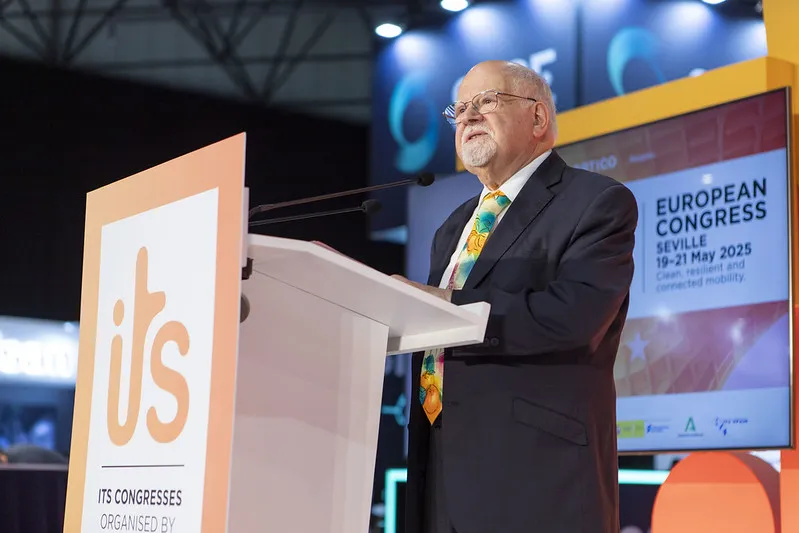
Professor Eric Sampson, chief rapporteur at the 16th ITS European Congress in Seville, has called on the ITS sector to move forward at speed.
In his closing remarks at the Congress, he said: “In Seville, we saw more than innovation – we saw determination."
"The path forward is no longer about what we can create, but how swiftly we can deliver it. The ITS community must lead with conviction (or purpose): not just smarter mobility, but fairer, safer and shared. Now is the time.”
A full post-Congress report will be published in the coming weeks. In the meantime, awards were handed out for Congress papers:
- Best Rated Session: Dr Vassilis Agouridas, Ertico - ITS Europe
- Best Research Paper: Guoxi Feng, IFP Energies Nouvelles
- Best Technical Paper: Kyriaki Daskaloudi, Future Needs
Connected, Cooperative and Automated Mobility (CCAM) remained a cornerstone of the Congress, with clear emphasis on real-world deployment—from AI-enhanced shuttles and delivery robots to services focused on societal and environmental outcomes.
Emergent Technologies dominated the programme, illustrating Europe’s rapid digital transformation in mobility. Experts explored advanced data integration, real-time analytics, and the critical need for a harmonised EU data exchange architecture to enable seamless MaaS deployment and micromobility integration.
The Societal Aspects sessions highlighted how mobility systems are becoming increasingly attuned to the diverse needs of users. Technologies have grown more stable and scalable, while the importance of behavioural data and inclusive design took centre stage in many discussions.
In the Resilient and Safe Mobility track, delegates tackled challenges related to system complexity, cybersecurity, and climate impact. AI-supported predictive models emerged as a prominent tool for improving operational resilience. Several sessions also emphasised the importance of richer data on cycling—covering not only flow but safety and social impact as well.
Sampson traced the evolution of ITS from early single-purpose tools to today’s connected, user-oriented ecosystems. The current decade is increasingly focused on reliability, adaptability, and resilience, spanning both land and air mobility applications.
#ITSSeville2025 made it clear that European ITS is prepared to deliver mobility that is:
Accessible for all
Affordable
Resilient
Zero fatalities
Zero emissions
However, delivering on these goals in tandem remains a considerable challenge. While the technologies are mature, the pace of policy alignment must quicken, and collective commitment—financial and behavioural—is essential.
Looking ahead
The Congress pointed to clear directions for the road ahead. Progress will depend not only on technological advancement, but on deep, sustained collaboration between sectors, disciplines, and communities.
With renewed focus and collective drive, we move forward, ready to turn the vision of intelligent mobility into a reality that serves all.







